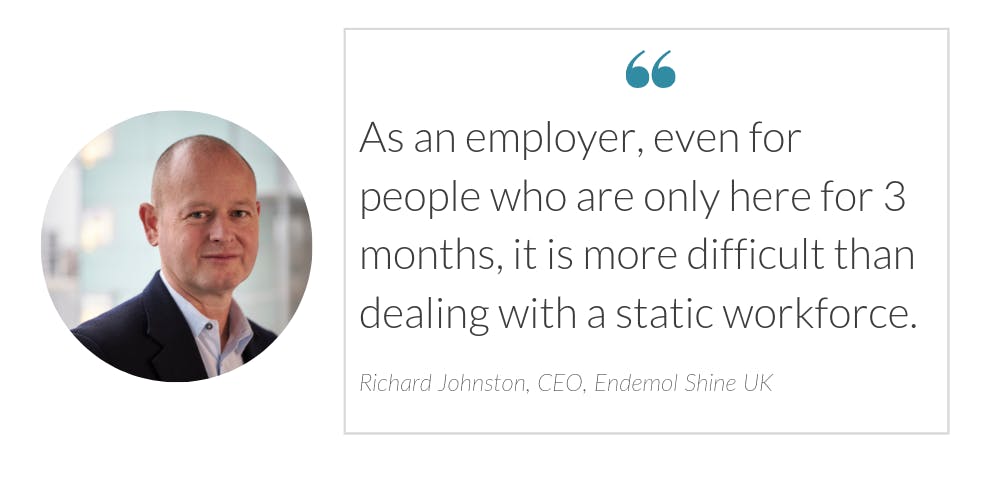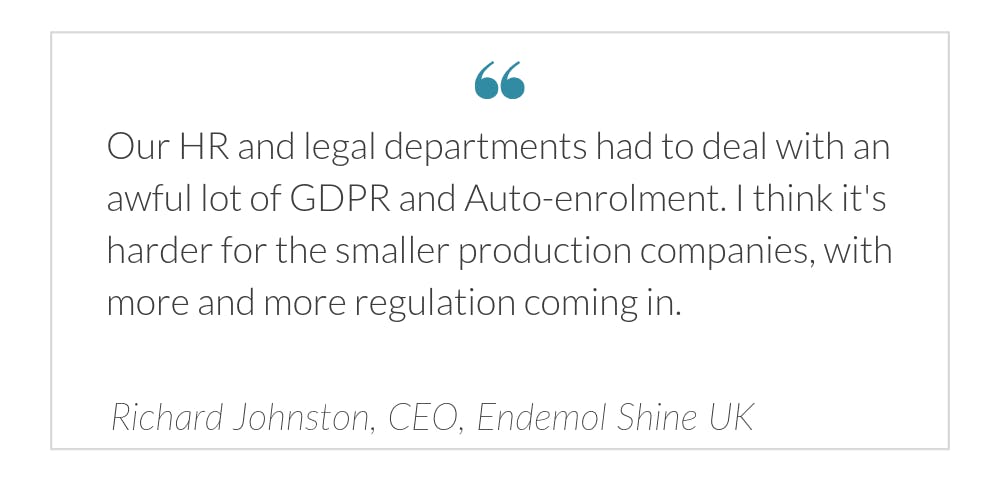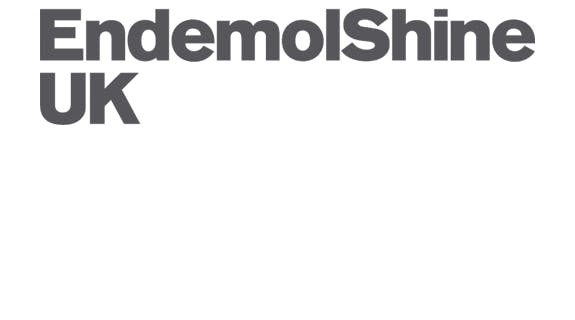Creative Spotlight Series #6 — Richard Johnston, CEO, Endemol Shine UK talks freelance workforce, regulation and skills development.
Here’s where we shine the spotlight on the brilliant people behind-the-scenes who bring stories to life day in and day out.
After a stint in one of the big 4 accounting firms Richard made the jump into Film & TV at a serendipitous moment. What’s followed has been a career mirroring the boom of the media industry.
Chloe Chesterton, Commercial Director at POP met with Richard at Endemol Shine UK HQ to discuss Richard’s experience at the helm of one of the country’s biggest media employers and as Chair of Screenskills, the industry-led charity setting the standard for skills and professional development in production.

POP: Thanks for joining us Richard — let’s start with your story. Broadly speaking, how did you get to where you are today?
Richard Johnston: I was an accountant. After university I didn’t really know what I wanted to do and I fell into accountancy because they were offering jobs. It was the early nineties, there was a bit of a recession on and they were literally the only people recruiting so I thought I’d do that. I did that for about 4 years, it was fun socially, but I wasn’t enjoying the work massively so I decided I needed to do something a bit more fun. The good thing about having the qualification is you can move into any industry because everyone needs finance people. So I started in TV & sport, the two things I thought would be fun and I was interested in.
I got a job at a production company called Bazal Productions, which as luck would have it was on its way up. The week I started, ‘Changing Rooms’ launched, then ‘Ground Force’ and suddenly this little production company that I thought I’d be at for a couple for years was the place to be. Bazal was bought by Endemol and so working through the acquisition process was more good learning.
Then there was this strange format that people kept talking about where you get people in a house and film it — and it was like, “God that’ll never work”, but ‘Big Brother’ was born and suddenly Endemol went from being a production company to the biggest production company in the UK.
Off the back of that, right through the noughties, we had endless hits and then IPO’d in 2014. I started off as a Financial Accountant then onto Business Development, then Finance Director, then COO and then after the merger with Shine in 2014, I got the job as CEO of the combined UK.
POP: The industry is crying out for Accountants at the moment, isn’t it?
RJ: It is. As I’ve shown it doesn’t mean you’ll be in finance all your life. If you’re reasonably good at understanding finance, which is a part of any job anyway, it’s never a bad background. If you want a pure creative role, of course it’s less relevant. If you’re interested in the business of television, production management, or running the business, then having a finance background is very helpful as it’s in the suite of skills you’ll need.
It was also a massive stroke of luck to join a company that was on its way up. Every time it felt like the job or the company was reaching a natural point to change, something would happen. Either I would get a promotion, or there would be a merger or acquisition with a whole new load of opportunities. I’ve been lucky to stay in one place and develop massively during that period.
POP: So your trajectory has echoed the boom within the media industry in the UK?
RJ: Yes, and the boom of what was Bazal, now Endemol Shine Group, I’ve grown with that company.
POP: With consideration for the media boom, across various platforms and different partnerships, how do you see this boom playing out in the next 5–10 years?
RJ: It’s not going anywhere. At the moment from the production side of things it’s all reasonably good news. More customers mean more demand for content mean more business for people like us. My concern is not for the next year or two but 5–10 years hence out that our linear customers continue to be strong and able to commission content in the way they do now.
POP: Do you see the champions succeeding and the market getting squeezed when customers are not prepared to pay for 5 different platforms, is that the worry?
RJ: I think that is the worry, how is this going to shake down? How many streaming services, how many different subscriptions are people really going to want to sign up for? I think it’s going to be really hard, especially when all the new ones come, Disney, Warners, ComCast, Britbox. A lot of analysts think they’re going to lose lots and lots of money for a while. At some point it may change back again, I don’t know.
POP: When we think about how the industry is run which is very much a network focused world. Endemol Shine Group are a huge network plus all of your Production Companoes that you work within the business, and then all of the people that they hire at a freelance level — what challenges do you see in being able to continue to support the growing industry as those tentacles get wider and wider and the skills needs to keep that industry functioning in a really healthy way?
RJ: I think the industry is doing quite well in terms of skills needs. As you may know I’m chair of ScreenSkills, previously Creative Skillset, we’re positioned as the training skills body for TV and film industry. What I’m trying to get to with that is a combined, coherent industry approach to the issues around skills, around training, around diversity, and have a strategic framework that we’re all signed off on which we can then have the funding to implement.
We’ve got quite good funding from various places, The BFI, High-End TV levy, and we’re trying to lobby to get this introduced for rest of TV as well so that every TV program pays a skills levy, a skills contribution, which we’re making reasonable progress on. We’re talking to main broadcasters about that and Pact are in favour of this as well and I’m positive we’ll get there but it’s quite hard to get everyone to jump on at once.
That would enable us to have a coherent strategy that looks at the main issues around information at schools and making sure that certain people know what the opportunities are, entry level access and then providing the training and bootcamps for people trying to get into the industry, to learn the ropes. And then continuing development once you’re in, making sure that people have continuous access to up-skilling.
POP: What about joining those dots as we’re an industry of freelancers? What kind of alignment across the industry do you see as most helpful in making everybody agree to doing the same thing and coming on board with initiatives?
RJ: I think we’re getting quite good as an industry. If you look at the High-End TV levy that’s a great example, the compliance rate is up around 96/97%. Virtually every big drama now pays a skills levy and that money raises millions of pounds a year which is being spent on the issues that we know about.
We could do more if we got the non-high end levy as well then we’d be in a really good place. It is tricky with smaller Indies, most of them have pretty short shoe strings and don’t have a lot of spare cash or time, so it’s always going to be on us, the bigger players, to do the lion’s share. We’d like everyone to come on board and do what they can because the danger is where we purely rely on the BBC to train everyone up, those days are gone.
POP: In terms of diversity and inclusion (D&I) across the industry in its broadest sense, we all have an appetite to make things better and make improvements. When you’re asked about D&I, is there one piece of action that you say, well this is what you can do today to change things tomorrow and make them better, what are your nuggets of advice?
RJ: There is never one action that is going to solve these things, it has to be lots of different things that solve it, there is no silver bullet.
One thing we are trying, which is only one part of the solution, is having more regular networking. It is the lack of networks that I think people coming into the industry from non-white non-middle class backgrounds struggle with. They don’t necessarily have a network of people that they naturally know who they can talk to, refer them on, tell them about this job or opportunity, or recommend them to a friend or whatever it is.
So we’re trying really hard to have a series of evenings we organise and pay for, with people invited from this building, talent from disadvantaged, BAME or underrepresented backgrounds and commissioners come along as well. We’ve done a couple so far which have been hugely successful so we’re going to do one a quarter.
At the last one I did a speech and said; “one thing I want you all to do tonight is not to leave here until you’ve talked to at least 5 people you don’t know. Everyone is here to meet people and chat so don’t stand there talking to people you already know.” It’s not an easy or natural thing.
People like me still find it hard to just go up to people and start talking and that’s after being a CEO and 20 years in the business. So you can imagine how intimidating that is for people coming into the industry.
One of the things we’re focusing on at ScreenSkills is getting measurable outcomes because everyone can say it’s going well or it’s not going well which is all based on our perception.
What we need as an industry is a lot more data that shows us a) the extent of the issue and b) what’s the progress we’re making. It’s all about the progress we’re making because you’re never going to get it right on day one or day two but we all need to see progress in the right direction, so that’s what I’m really focused on.
POP: Connecting all of those data dots across the industry is very complicated isn’t it?
RJ: Oh it’s really hard. Look at Project Diamond — getting people to actually fill stuff out is really hard, but without it, it’s impossible to get any kind of empirical analysis of how we’re doing.
POP: That leads us into the freelance workforce and the way the industry is set up is one of the reasons that challenge is so great. You can be making any number of shows at any one time but the proportion of freelancers that aren’t immediate hires of ESG are numerous.
POP: Do you have a sense of what proportion of your workforce are freelance?
RJ: Yes — it varies depending on how many productions we’re making. Probably 60–70%, we’ve got about 400 permanent staff and another 700 freelancers. It does fluctuate in the freelance section but most people working on productions will be freelance.
POP: And as one of the biggest media employers in the UK, how do you manage duty of care for the whole workforce but especially that freelance pool?
RJ: Everyone that starts here has an induction and is given all the relevant instruction and information. We are very clear on our policies on all areas of production including whistleblowing. We are pretty clear on how to blow the whistle, how to handle anything inappropriate going on or anything they’re worried about. There are channels, there are helplines, there are ways of raising grievances, and people do. If there are people in that freelance workforce that are not following workplace procedures, it’s very hard for us to pick it up unless someone tells us and that’s the hardest bit of being freelance. As the industry matures, freelancers know and are very used to working in these situations and would hopefully know how to behave and respond.
POP: Do you see Endemol Shine as flag bearers, pioneers within this space with the position you hold?
RJ: Absolutely, I’d be very disappointed if we weren’t seen as best in class in all these areas. We certainly strive to be.
POP: As employers, sticking with the freelance piece, all of the new regulation ie. GDPR, payslip, auto-enrolment and IR35, and the legislative changes which are hard to police in that world, have they taken effect in any significant ways?
RJ: Yes.

We’re a big company so we can manage it, but I think it’s harder for the smaller production companies, with more and more regulation coming in.
POP: Absolutely, without a well resourced HR and legal team it can very difficult to navigate.
POP: Do you think that industries with growing numbers of freelance workers like events, technology, gig economies etc can learn from how film & TV has evolved, whether good or bad?
RJ: The main one would be duty of care.
As an employer, even for people who are only here for 3 months, it is more difficult than dealing with a static workforce.
So making sure you have policies and procedures in place that those freelancers know about, more than just being available on the website, but having proper inductions, so it can’t be said that they didn’t know or no one told me because you have been told and this is how this company works and this is how you deal with it. So having some basic policies and procedures in place is something anyone can do.
POP: Who have you personally looked up to for inspiration in your career? Who’s set a good example that you’re proud to have learnt from?
RJ: I’d have to go back to Peter Bazalgette, my first boss when I started at Bazal Productions. He owned Bazal and then Endemol UK after that and is now chairman of ITV. He led a fantastic example, very clever guy, very talented, but fundamentally decent. Treated people very well, was polite and helpful to people. To me he was real proof that you don’t need to be an arse to get ahead. He was talented, he didn’t need to bully or step on anyone to do it. He did it with real charm. He was a really good example. There were lots of people who worked for Bazal in that era of Endemol UK who have gone onto very successful careers and I imagine they all probably learnt a great deal from the way that that company was run.
POP: Its impressive that the prolific rise of that business and organisation and then how the seeds of that have planted around the industry.
RJ:
It’s really important that it only takes for you to have been inspired by one decent person doing a really good job of running a business and being kind and humane and then that’s how you start to rise, how you run your business, and hopefully the people you affect are inspired by what you’re doing and will continue to do the same thing.

